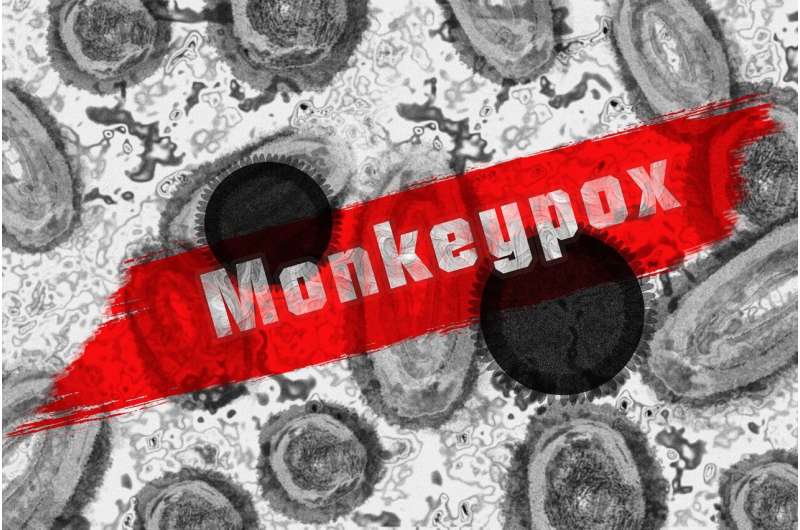Dearth of high quality monkeypox guidelines may be hampering care globally

A dearth of high quality, up to date clinical guidance on monkeypox may be hampering effective and safe treatment of the infection around the world, concludes a review of what's available to guide patient care and published in the open access journal BMJ Global Health.
Existing guidance, such as it is, too often lacks sufficient detail, fails to include different groups, and is contradictory, say the researchers.
Since the first human case of monkeypox infection was identified in 1970 in the Democratic Republic of Congo, it has mostly been reported in Central and Western African countries. The ongoing outbreak in 2022 is the first to affect several non-endemic countries, with 257 confirmed cases in 23 countries reported, as of 26 May 2022.
The infection is mild in most cases, but younger children may be at higher risk of severe infection. And while the death rate is usually low, evidence from Africa suggests it can be fatal in up to 10% of cases, particularly in younger children.
Complications include painful pustules, secondary infections, bronchopneumonia, encephalitis (brain swelling), keratitis (inflammation of the eye's surface) and psychological symptoms.
Monkeypox in people is spread through direct contact, such as from bodily fluids and respiratory droplets, indirectly from contaminated surfaces, and vertically from a mother to her fetus through the placenta.
Even when the evidence base is limited, clinical guidelines are important for informing and standardizing the best available care for patients around the world, and for enabling further research to identify new treatments, say the researchers.
They therefore set out to assess the availability, quality, scope and inclusivity of available international clinical guidance on the treatment and supportive care of patients with monkeypox infection.
They searched 6 major research databases for relevant content published up to mid October 2021, plus the "gray literature"—policy documents, newsletters, reports, for example, published up to May 2022—in several languages.
They found 14 relevant guidelines. Most were of low quality according to the Appraisal of Guidelines for Research and Evaluation II (AGREE) system, scoring an average of 2 out of a possible 7. And most lacked detail and covered only a narrow range of topics.
There was little provision for different risk groups: only 5 (36%) provided any advice for children; and only 3 (21%) provided advice for pregnant women or for people living with HIV.
Treatment guidance was mostly limited to advice on antivirals and wasn't consistent: 7 guidelines advised cidofovir, 4 of which specified this only for severe infection; just 4 (29%) advised tecovirimat, and 1 (7%) brincidofovir.
More recent guidance, including from the World Health Organization, recommends the use of tecovirimat rather than cidofovir.
While cidofovir and brincidofovir are active against pox viruses in laboratory studies, there are few data on how well they treat pox viruses in people, added to which they are only authorized for use in certain countries, note the researchers.
None of the guidelines detailed optimal dose, timing or length of treatment. And only one guideline provided recommendations on supportive care and the treatment of complications.
All 14 guidelines recommended vaccination as post-exposure prophylaxis (PEP), but not all of them were up to date on the newer generation vaccines. And PEP guidance for different risk groups was limited and at times contradictory.
The researchers acknowledge that understanding of the monkeypox virus is still evolving, which may account for some of the variability in recommendations they found.
But they say that "even with a limited evidence base, clinical management guidelines are important tools for guiding decision-making and to reduce risk of inappropriate treatments."
They add that "the lack of clarity between guidelines creates uncertainty for clinicians treating patients with [monkeypox] which may impact patient care."
And they conclude that their "study highlights a need for a rigorous framework for producing guidelines ahead of epidemics and a recognized platform for rapidly reviewing and updating guidance during outbreaks, as new evidence emerges."
"Human [moneypox] is providing a challenge even in high-resource settings with well-resourced healthcare systems. The lack of guidelines may especially impact clinics with limited previous experience in managing patients with [monkeypox]."
Given the recent global publicity surrounding monkeypox, this is an opportune moment to harness interest and investment in further research to make sure that everyone is given the best treatment, they say.
More information: Availability, scope and quality of monkeypox clinical management guidelines globally: a systematic review, BMJ Global Health (2022). DOI: 10.1136/bmjgh-2022-009838



















